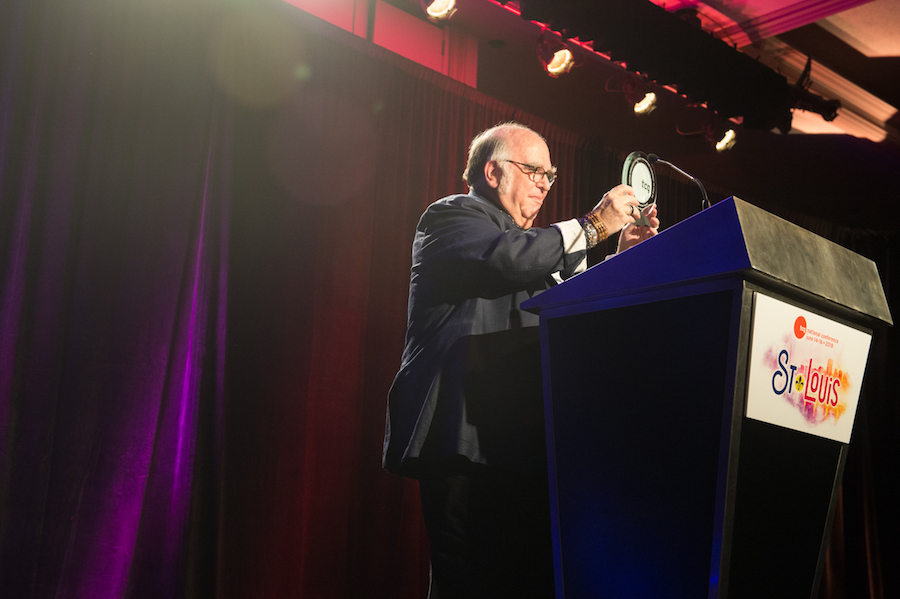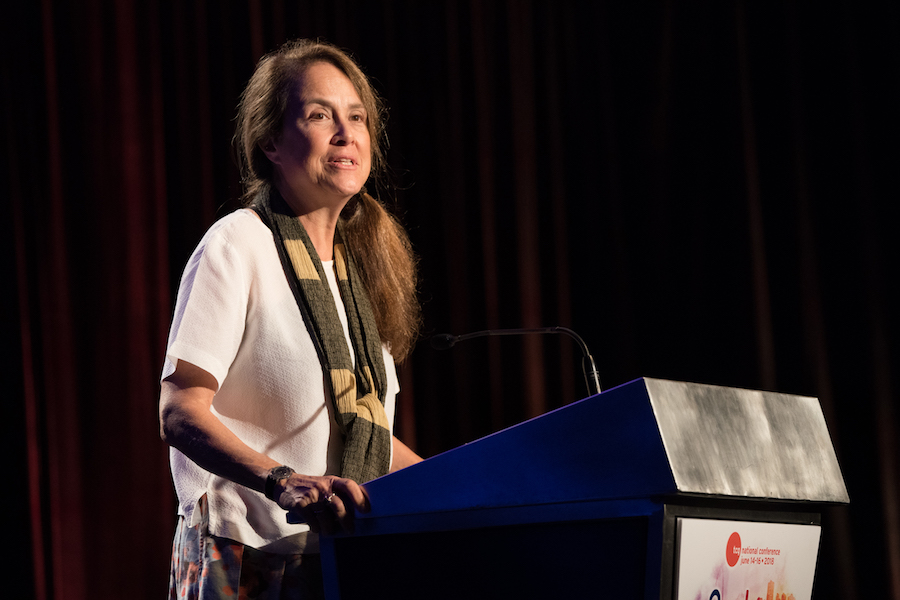ST. LOUIS: If there was a theme to the opening plenary of Theatre Communications Group’s 2018 National Conference, it was poetry. From the powerful opening performance by local slam poets Majovah Bastien and Zack Lesmeister to Naomi Shihab Nye’s lyrical keynote speech, the first day of TCG’s annual conference powerfully demonstrated, in case anyone thought otherwise, that there is art in St. Louis—art with power, purpose, and potency.
Perhaps we have all overlooked this place, TCG executive director Teresa Eyring admitted to a crowd of nearly 750 conference attendees at the Hyatt Regency St. Louis, directly across the street from the stunning 630-foot Gateway Arch, which she called “a monument whose soaring beauty is complicated by its origins in honoring the westward expansion and thereby the horrors of Manifest Destiny. We acknowledge that this place has always been at the heart of change in our national story.” From the displacement of Native Americans to the Missouri Compromise to the Ferguson protests, she’s right about the city’s centrality to the dilemmas of American history.
Or, as Bastien and Lesmeister put it in their performance: “You must have forgotten who I am, you are, blinded by your weakness. And your nation crumbles because there’s too many bones on the battlefield.”
Make no mistake: The opening plenary was not a dour event. Far from it. Just as bitterness can make sweetness taste even sweeter, the artists onstage also shared joy and the beauty of storytelling. The country may be in a transitional place, but the artists gathered in that ballroom were looking for, as Nye said, using a quote from the pilot on her flight into town, “a short window of smoothness” before the next bit of turbulence. Art-making is hard, being a citizen is hard, but through the act of communing with each other, perhaps we can all draw the strength to keep fighting.
Prior to Nye’s speech, two TCG awards were given out. Steven Woolf, longtime artistic director of the Repertory Theatre of St. Louis, received the TCG Theatre Practitioner Award for his 33 years at the company. In his speech, he quoted Arcadia by Tom Stoppard, saying, “‘It’s wanting to know that makes us matter. Otherwise we’re going out the way we came in.’ I just want to know, I don’t know enough. Our particular profession gives us the ability to share this passionate desire to know through the telling of great stories.” Woolf announced last year that he will retire from the theatre in 2019.

Then May Adrales was honored with the Alan Schneider Director Award for her work on such productions as Vietgone by Qui Nguyen and Edith Can Shoot Things and Hit Them by A. Rey Pamatmat. Adrales admitted that when she first attended a TCG conference at age 21, she “was terrified of everybody in this room.”
In accepting the honor, Adrales spoke about having never assisted a woman or a person of color earlier in her career, and because of that lack of representation of such bodies onstage and offstage, she said, “I take the mantle to shift the narrative of the American theatre to embrace present more than a single story,” she said. “To redefine what it means to be American and what it means to have an American family and rewrite that classic American story, and reframe history and create new classics and new ways of storytelling. I want to show that work directed by me or women like me, works written by women, are not risky. They’re essential and essentially American.”
That made a fitting segue to the evening’s main event: an address by poet Naomi Shihab Nye, who was born and raised in nearby Ferguson by a Palestinian father and a white mother. From her first words, Nye had the audience’s heart. “This is the happiest moment of my life,” she enthused. “Why did I hang out with poets all these years? Theatre people are so much more fun!”
She spoke about her father, a journalist who loved to learn about other people even if they didn’t share his worldview. “He always said, ‘If we just spent a little time with people in a normal way, having dinner, sharing food, sharing stories, we could solve the political problems of the world.’” She noted that as “the only Arab in Ferguson,” he would have been happy to see The Band’s Visit, a story about Egyptians and Israelis bonding over music, win Best Musical at the Tony Awards last Sunday.

In addition to her work as an author, Nye has spent the last 44 years teaching kids to write poetry. Her key to unlocking their creativity? “I have encouraged them to look at the worlds they come out of,” she said. “Many times I have been greeted by blank faces who say, ‘Ma’am, I have no characters in my life, my neighborhood is uninteresting, I have done nothing.’” That changes, she said, when she asks them to think about the actual people and the human dramas that fill their lives.
She then showed a slide of a poem by one of her students, Luis Alonso, whose hand-written poem, “Where My Writing Comes From?,” answered that question with touching, quotidian details, such as, “The joy in my dog’s eyes when we remember/How we used to play together.” Like theatre, she said, poetry is all about finding beauty in the ordinary.
It was clear from Nye’s speech, full of anecdotes and home photographs that sent the audience into fits of laughter, that she was successfully drawing a parallel to what she does as a poet to what a theatre artist does, which is—to echo Woolf—tell stories.
“To be born again and again throughout one’s life, to new thinking, new inspiration, new understanding, new possibility, and perhaps a greater gift, every day to be aware of how much there is to know,” said Nye. “Everyone has said that here tonight: to be born again and again through art. You are the beacons in this field, you transport your audiences to other families, other realms, other experiences, other nations. You give us other times to add to our own times.”
Nye didn’t make too many allusions to politics, but she didn’t need to; the audience could make those connections on their own. Instead, she closed her speech by reading her short story “Gate A-4,” about a spontaneous celebration among diverse women waiting at an airport, sharing cookies and juice and culture. The last lines of the poem seemed to serve as a talisman for those leaving the room: “This can still happen anywhere. Not everything is lost.”


